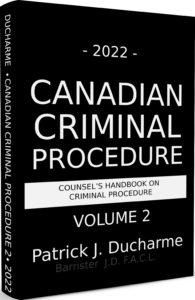 |
| Patrick J Ducharme |
Prosecutors have a special duty to refrain from any submissions before a jury that might be considered inflammatory. They must also refrain from any expressions of opinion concerning the guilt of the accused or the conduct of counsel for the accused. It is inappropriate for the prosecutor to make negative comments about the accused personally or his character. The prosecutor should refrain from ridicule, exaggeration, sarcasm, or ethnicity.
Prosecutors also should never suggest that opposing counsel has used improper tactics or has presented illegal or inflammatory evidence or has made comments designed solely to portray events or circumstances dishonestly. If there has been any impropriety by counsel for the defence that alleged impropriety should be the subject of legal argument in the absence of the jury and with the trial Judge determining whether there has been any such impropriety so that the trial Judge performs the role of alerting the jury to any inappropriate evidence, commentary, or conduct. It is not the role of the prosecutor to supervise or chastise his or her opponent before a jury.
The Crown does not fulfill the role of a personal contestant matching his or her skills against counsel for the accused. The conduct demanded of a prosecutor is not restricted to trials in open court. It encompasses all the prosecutor’s involvement in any case leading up to the trial and even after the trial.
Although the prosecutor is empowered with broad discretion, and, our courts generally do not generally interfere with that discretion, but will, if it is exercised in an inappropriate way or for an improper motive or it impacts on the ability of the court to provide a fair trial for the accused. Consequently, that broad discretion must be exercised fairly, impartially and in good faith.
The purpose of a criminal prosecution is not to obtain a conviction. It is to lay before a jury, or a Judge, what the Crown considers to be credible evidence relevant to what is alleged to be a crime.1 The Supreme Court of Canada has outlined the role of the prosecutor succinctly. What follows is our highest court’s view of the role of prosecutor in a criminal trial:
“Prosecutors have a duty to see that all available legal proof of the facts is presented. It should be done firmly and pressed to its legitimate strength, but it must also be done fairly. The role of prosecutor excludes any notion of winning or losing. His function is a matter of public duty. It is to be efficiently performed with an ingrained sense of the dignity, the seriousness and the justness of judicial proceedings.”

The above is the an excerpt of Patrick J Ducharme's book, Canadian Criminal Procedure Volume 2, available at Amazon or in bulk through MedicaLegal Publishing along with Criminal Trial Strategies.
Subscribe to Patrick Ducharme's Youtube Channel
